- Home
- Al Sarrantonio
The Boy With Penny Eyes Page 4
The Boy With Penny Eyes Read online
Page 4
"Yes . . ." James Monk said, confused.
"Did I frighten you? I didn't mean to."
"No, I . . . You didn't frighten me." He found it difficult to concentrate.
"I'm here for you now."
James looked into the copper eyes. "You . . ." he said.
He had been transported to somewhere else. The sky was brightening, he felt the warmth of a high sun on the back of his neck, the green of the far trees was startling. He shook his head, trying to clear it. He still knew, somewhere way in the distance of his mind, what day it was, that when he had come to school this morning it had been a Saturday in March and that there had been gray clouds laid against the sky, high and flat as a blackboard, that a few flurries had dusted the sidewalk ahead of him before he entered the building. He knew that it was that same day outside, that it was getting dark and would soon be night. But a marvelous change had taken place. Spring was here. Spring had arrived, pushing the gray sky and flurries away with it. It was spring, his spring. He looked down and saw, felt, the brush of soft new grass against his feet; he felt the greenness of it, tasted the air itself. All the pores in his body were open mouths, drinking in the exact moment, obsessed, filled with it. And there before him, radiant, full, living, was . . .
His vision.
"I'm here for you," the child said.
"Yes."
"I belong to you!'
"Yes."
The creature came and put its hand on his arm.
Careful.
"Wait," he said suddenly, sharply, looking into the brightness of those sunlit eyes.
"Is something wrong?" the child asked.
His mind was on fire.
"I have to be careful," James Monk said.
"It's all right," the child said.
"I can't ..."
"You can. It's all right." The child brushed his cheek with its fingers, smoothed the thin hair softly back from his forehead.
"But—"
Suddenly, he knew what was wrong. He was never meant to be fulfilled. There was no possibility of his vision ever being consummated. In his mind, for a moment, one burning thought connected with another.
It's a trick.
"It's not a trick," the child said.
The thoughts separated, burned away to white ashes.
"But—"
"Do you hear music?"
He heard it. It rose like a feather across his cheek, then wrapped around him like the soft wind in May. Mozart. A beautiful ache, delicate as spun silver around white clouds, liquid notes rolling like blood. Life itself. He saw his mother as he had as a baby, saw the soft longing look in her eyes, felt the touch of beauty on him. His mind once more was free to float above the earth, out of his own body, exalted. He was music. And then the two moments merged, became tearful, exact, beauty itself, and he looked up to see the child, its eyes burning warm like the sun, its hand, white as milk, touching his head, the smile, the smile of an angel, the fingers, milk-white, caressing him, holding him as a mother holds its baby, brushing his brow, his hair, his neck . . .
"Do you hear the music, James?" it said to him, this mother and child, and in his moment of attainment he cried.
"Yes! Yes!"
He saw something held above its angel's body, in its pure-white hand. It was silver, like the clouds and moon, a painful, gleaming, radiant thing. The creature brought it down toward him, and then beautifully across his throat like the bow of a violin across its singing strings.
Mozart.
Spring and music went away. The lights went out, and the door clicked shut on him, and there was laughter, and, finally, James Monk screamed.
9
The Reverend Jacob Beck thought, The night is dark.
The night is always dark. He laughed to himself, a low sound that echoed around the church as if he had barked through a microphone.
The night is always dark.
Here was another profound thought for another profound sermon. He sat down on a bench and rubbed his eyes. What time was it? He held his watch up toward the small light that always burned in the back of the church, but it wasn't enough for him to be able to tell accurately. Something o'clock in the morning. Another long Saturday night and he was where he always ended up on Saturday night.
The windows were still dark, so perhaps it was only four o'clock—he had two more hours to suffer, before his brain would do what it always finally did.
The night is dark.
He laughed again, sure now that it must be nowhere near dawn, because his mind would give him nothing but this.
He yawned. Then, leaning forward, making the bench creak like loud cracking knuckles, he pulled a many-folded piece of paper from his back pocket and smoothed it out for the twentieth time. "Hate the evil," it read, "and love the good, and establish judgment in the gate."
And so on, he thought. But what came next?
He didn't know.
He stared straight ahead, trying to find something in his thoughts to hold on to. Abruptly, without thinking, he brought his fist down on the bench in front of him. He was startled to see that the force of his blow had actually cracked the wood.
Why did I do that?
He knew why: he was spending another insomniac Saturday night in an empty church trying to figure out what to say the next day when the church was full. He had a single line of biblical dialogue in front of him, something that had looked good a month ago when he'd pulled it out of the Book of Amos, something that had looked like he might be able to build on it. And now, as always, he had . . . nothing. There was nothing in his head.
Why did I really do that?
He stared hard at the splintered wood of the railing. He knew the answer to this also. But did he want to think about that? It wasn't because of the sermon. After all, he had always had this problem with sermons, right from the beginning, and he knew that eventually, just as dawn broke, the ideas would start to coalesce; and that before seven o'clock in the morning he would have in his hands a complete text, written out word by word on note paper; and that he would deliver it at eleven o'clock and it would sound good coming from his mouth and they would all go home and think about it, some of them think it profound even, maybe one or two of them even think hard about it, think about it so that it would change their lives . . .
He barked a laugh again, hearing it bang around the walls like a hardball, and he knew what was wrong with him.
I don't believe any of it. They don't listen, and I don't change them. "And even if I do," he said out loud, "I don't care!"
His fist came down hard again. This time he felt pain in his hand. Easy, Jacob.
He leaned back and took a long breath, closing his eyes and letting his mind clear.
So that was it. I don't care. All the talking and the social work, the teas, the smiling old ladies with hands like dried apples—he didn't care about any of it. He thought of those hands laid gently on his own, so lightly that if he pressed them they would fall apart like old parchment, the eyes giving away the truth not in the smiles, not here for long, almost gone, almost gone . . . dead . . .
And to where?
Who cares?
He raised his hand and then slowly lowered it, looking once more at the paper he held without reading it.
He knew how foolish he was being, that this was something they all went through. Had to go through. He'd been told about it long ago, by a Catholic priest no less, who had gone too far with the after-dinner bran-dies one night and confessed that he had once lost his faith altogether. "Two years," he had said, his eyes misting over in a kind of wonderment. "For two years I didn't know what I was doing, didn't give a crap about any of it." His eyes came back to Jacob, and he put his finger on the rim of his glass. "It was around the time of the Vietnam War, and I nearly became an alcoholic." He laughed. "The Vietnam War, when everybody looked at everything they were doing and decided it didn't mean anything. I thought about leaving the priesthood, about becoming anything else, a folk singer, a
riverboat captain"—he held his glass up in a toast—"what do you want to be when you grow up, Father Marchini?" Again he laughed, but there was as much seriousness as drunkenness in his eyes. "And I nearly did, Jake. I nearly chucked it out the window, right onto the sidewalk. Then one day I came back to my room, looked at the bed with the crucifix over it, at the little table, the thirteen-inch color television, the little shelf of books—and everything was all right again."
"Just like that?"
Father Marchini shrugged. "Damned if I know how it happened, Jake. After that, I couldn't understand why I had ever doubted any of it." He took a lengthy sip from his glass and regarded it. "God, I haven't had this much alcohol in a long time." He looked back at Reverend Beck. "But I found out that I was a damned fool to think that I had been the only one going through it." He waved his glass. "Ego, ego. After I talked about it I found that there was only one priest out of all I knew who had never gone through something like it. And he was another story altogether." He looked off somewhere, smiling. "Father Farady, the Marine of priests—but, like I said, that's another story."
After they had had a final drink, Marchini had told him, grinning, "So worry only if it doesn't happen to you, Jake. Which won't make it any easier." He laughed. "But I imagine it happens even to Unitarians, like you, who believe in nothing but the human race; but must even come to doubt man, which, believe me, is a lot easier than doubting Him." This had been their last toast of the evening.
Even Unitarians like yourself.
Which made it all the harder for him, because there had never seemed to be anything to come to doubt. He looked again at his piece of paper: "Hate the evil, and love the good." What in God's name was so hard about that? That was just being a human being. What was there to disagree with? Nothing. But that wasn't the point. The point was . . .
I don't care anymore.
He rose, and looked at the windows. He had been wrong. The formerly dark sky was beginning to tint with color, a blue-black that always led to dawn. He held up his watch but still could not read it—though it must be close to five o'clock instead of four. That meant that soon his mind would begin to work. And he would write out that sermon, easily, and they would all listen to it, and go home, and . . . nothing.
You're a jerk, Beck.
Father Marchini, whom he had grown up with, had once jested to him that if you couldn't be a Unitarian, you couldn't be anything. But Jake knew that wasn't true, just as Marchini did. (They had once had another all-night session arguing over what religion really was. Pathway to God, or man? He remembered they had ended up agreeing on something, but was too drunk to remember what. But that had been the joy of it.) He knew that believing in man was even harder in many ways than believing in God. Not that God was left out of it, but putting such a heavy burden on such a cracked mechanism as man could strain anyone to the limit.
Maybe you don't believe in yourself anymore.
Ah.
Or maybe you just need a vacation.
He found himself laughing, this time genuinely, and that took some of the hurt away. Maybe things would resolve themselves before too long. He knew that Mary had begun to notice his moods. Maybe he was reaching the crisis point. Soon he would do what Marchini had done: either walk into the room and see everything as it was and as it should be, or leave Mary and his daughter and his pastorage and . . . become a folk singer.
He laughed, and his fingers tightened on the slip of paper in his hand, and suddenly he knew what his sermon would say.
He left the church, and for the next twenty minutes he wrote furiously, filling the legal pad on his office desk with his badly spelled script. Then, looking out the window, he saw the sun, now a ball resting on the treetops, signaling the true birth of another Sunday.
For an unusual moment, calm descended upon him. There was something about watching dawn come that made him forget the turmoil his mind had been in. The event—the rising of the sun, which could be seen as just the astronomical start of another day, a day just as the one before—could also be seen as a miracle of beginning. Maybe that was what was wrong with him: he had forgotten how to look at things. He pushed the finished sermon aside and swiveled his chair to look straight out into the dawn. There were dew-covered trees out there, birds were beginning to sing, flowers were opening to look into the sun as he was, living things . . .
His mood was broken by a soft knocking on his study door.
"Mary?" he called out, turning toward the sound. The door opened. He was surprised to see his wife up this early; usually she was a sound and long sleeper and wouldn't be up for another couple of hours. He knew immediately by the look on her face, by her tangled hair and the fear in her eyes, that something had happened. For a moment the sense of foreboding that had come over him earlier in the church returned.
"What's wrong, Mary?"
"Jacob, please come."
"What is it?"
"Please . . . " Her voice shook.
"Mary, are you all right? Christine—"
"Christine is fine." Her hands fluttered before her, as she tried to straighten her thoughts. "Come with me, Jacob."
He rose from his chair, puzzled. He followed her across the front hallway, past the rows of inlaid bookshelves fat with old volumes, untouched books in locked, keyless cases that had been through pastor after pastor. Someone had once told him that there were presentation copies from Hawthorne to Melville in there, which had only deepened his resolve to someday find that key.
Mary pushed open the deeply oiled door into the pantry, and they passed through it into the short hallway that led to the path between church and pastorage.
"Mary, where are you going?"
"Just follow, Jacob." She wrapped her bathrobe tightly around her and pushed through the door. The early air was chilly and damp, and he caught up to her and put his arm around her. She was shivering. She looked up at him for a moment, and her eyes were like those of a hunted animal.
"Mary," he began, but she pushed ahead, using her latchkey and throwing open the side door to the church, and walked steadily, as if in a trance, to the center aisle and then down it toward the back. Reverend Beck noted now how this place that had been nearly pitch-black an hour ago was filled with rosy light, how the benches gave off a warm waxed glow and the windows were filled with morning. In a few hours the light would be complete in here, and he would stand before a full congregation . . .
"Back here, Jacob."
She was at the rear of the church. For a moment he thought she would push open the great doors and let all of the morning into the place. But at the last row of benches she stopped. She turned her head to the side. Her hand came out of her bathrobe. He saw how white it was as she pointed.
"There."
He looked, and in the half-light he saw what she indicated—a bundle of clothing that solidified as he watched into a huddled figure. It was a young boy. He had been lying on the bench, a backpack under his head for a pillow. Now he sat up. He stared at the two of them, regarding them out of a strange, silent face. The boy had copper eyes, with a calm in them so deep and purposeful that Jacob Beck felt an involuntary shudder pass through him.
"I woke up and felt I had to come out here," Mary said. "I don't know why, but I had to. I thought that something had happened to you. But when I got by the side entrance, I saw you weren't here, and I became afraid. But I couldn't leave. I had to come and look. He was lying there."
"There's nothing to be afraid of, Mary," Beck said.
Jacob Beck held his shivering wife tightly. He had never seen her like this before. He turned to the boy, who still sat quietly at the far end of the bench, looking at them out of those eyes.
"Who are you?" Reverend Beck asked, trying to make his voice both kind and commanding.
The boy had turned away from him to unfold a neatly creased black golf jacket and put it on. He picked up his rucksack.
"Who are you?" Jacob Beck repeated.
"My name is Billy Potter," the
boy said calmly.
There was an infinite moment of silence as Jacob Beck realized that the boy must have been with him, alone in the church, the whole night.
10
Awake.
Billy Potter's eyes opened. The ceiling rippled; a thick, long bar undulated like the surface of the ocean seen from a great height. He heard a whirr somewhere, and the lap of water against a shore.
He sat up.
The shades in the room were half drawn, but still the brightness of the day outside streamed in. The room was large; the walls were bright peach, with wallpaper showing tiny flowers. The furniture was white lacquer. There was one tall bookcase, with only one shelf filled with books, the rest lined with knickknacks and a row of identically faced dolls dressed in different national costumes. There were stuffed animals everywhere—bears, mostly, with rabbits, a large pig, and something huge and white wearing a Mexican sombrero and sunglasses. A Snoopy poster, framed, was mounted over the desk, next to which was a box filled with record albums.
There was an aquarium on a wrought iron stand on the other side of the desk; the slap of the ocean came from its gurgling pump, and the rippling on the ceiling from the outside light reflected from its surface. A few fish moved lazily within, finning their way through a stone castle and around green plastic plants. One large, cautious thing in the shape of a goldfish hid in one corner near the bottom, moving its fins listlessly and barely staying off the pebbles.
Billy put his feet on the floor. His shoes and socks were on the desk chair, his shirt and pants draped carefully over the back. He put them on. His rucksack was hung over the back of the chair. One of the straps had been opened. He refastened it. He left the backpack where it was and went to the door.
It opened with a creak onto a long silent hallway bordered in dark wood. There were other rooms. There was a bathroom with a huge white porcelain tub on black lion's feet, and a toilet with a pull chain on an overhead box. There was another bedroom, large and dark blue, with a huge poster bed, and filled with dark oiled furniture that resembled the wood in the hallway and looked like it had been built with the house. Across from the bedroom was a small room with a sewing machine in it; next to that, a room with a television, couch, and a couple of stuffed chairs. At the end of the hall was another bathroom, similar to the first but much smaller, with just a porcelain washstand and toilet.

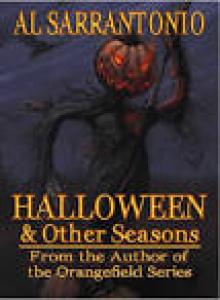 Five World Saga 01 Hornets and Others
Five World Saga 01 Hornets and Others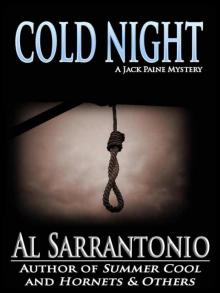 Cold Night (Jack Paine Mysteries)
Cold Night (Jack Paine Mysteries)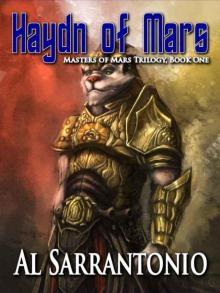 Haydn of Mars
Haydn of Mars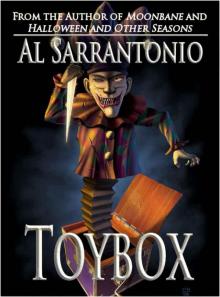 Toybox
Toybox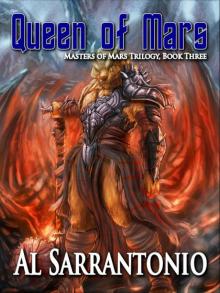 Queen of Mars - Book III in the Masters of Mars Trilogy
Queen of Mars - Book III in the Masters of Mars Trilogy Exile
Exile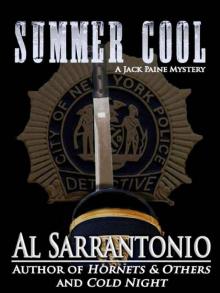 Summer Cool - A Jack Paine Mystery (Jack Paine Mysteries)
Summer Cool - A Jack Paine Mystery (Jack Paine Mysteries)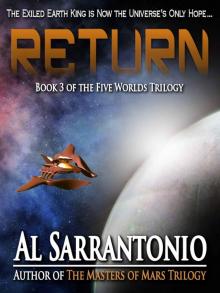 Return - Book III of the Five Worlds Trilogy
Return - Book III of the Five Worlds Trilogy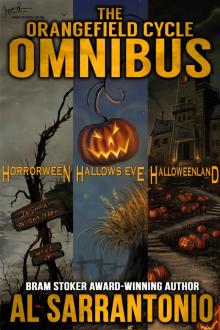 The Orangefield Cycle Omnibus
The Orangefield Cycle Omnibus Summer Cool jp-2
Summer Cool jp-2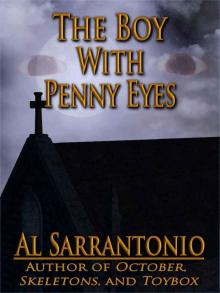 The Boy With Penny Eyes
The Boy With Penny Eyes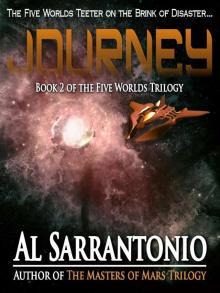 Journey - Book II of the Five Worlds Trilogy
Journey - Book II of the Five Worlds Trilogy Kitt Peak
Kitt Peak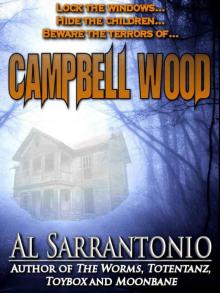 Campbell Wood
Campbell Wood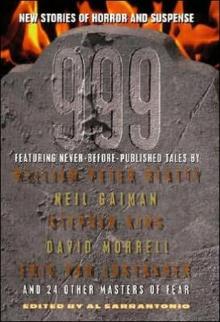 999
999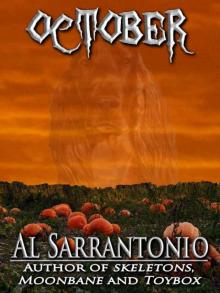 October
October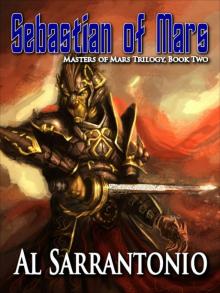 Sebastian of Mars
Sebastian of Mars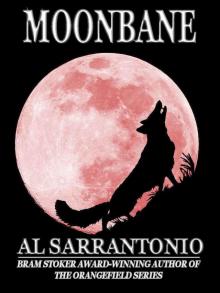 Moonbane
Moonbane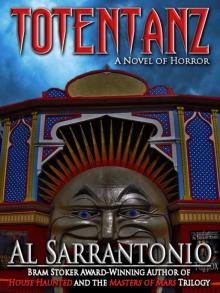 Totentanz
Totentanz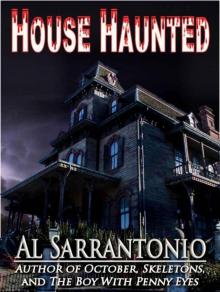 House Haunted
House Haunted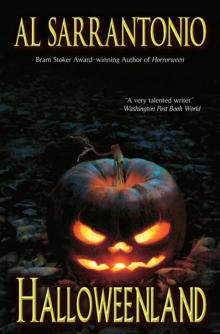 Halloweenland
Halloweenland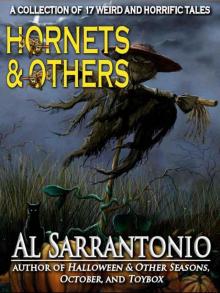 Hornets and Others
Hornets and Others